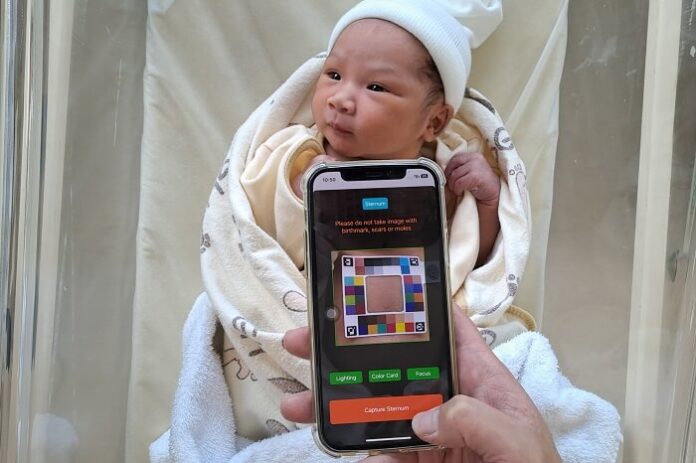

Singapore General Hospital (SGH), in collaboration with SingHealth Polyclinics (SHP) and Synapxe, has developed a groundbreaking smartphone app, BiliSG, to enable parents to screen their newborns for neonatal jaundice (NNJ) at home. This innovative solution, recently published in JAMA Network Open, promises to enhance convenience and safety by reducing the need for clinic visits.
Revolutionizing Jaundice Screening
Traditional NNJ screening involves using a handheld device to measure skin yellowness or a heel prick to analyze blood samples. The BiliSG app offers a non-invasive alternative by utilizing a machine learning model to analyze skin color. Parents capture images of their baby’s forehead, chest, and abdomen using a smartphone camera, aided by a specially designed color-calibration sticker. The app then predicts bilirubin levels, a key indicator of jaundice, with high accuracy.
Tailored to Local Needs
Unlike similar apps, BiliSG considers variations in skin tones, ensuring accuracy for Singapore’s multi-ethnic population. Principal investigator Dr. Alvin Ngeow, Senior Consultant at SGH, emphasized, “Other apps rely on a single point of reference and were developed in countries with different skin tones. This prompted us to develop BiliSG to meet local needs.”
Rigorous Testing and Validation
The app was developed and tested over two phases between June 2022 and June 2024. The study involved 352 infants for machine learning model development and another 194 infants for validation. Results showed 100% sensitivity, demonstrating the app’s reliability compared to existing methods.
Transforming Infant Care
BiliSG addresses the high prevalence of NNJ, which affects 60% of term and 80% of preterm infants. Early detection is critical, as severe jaundice can lead to brain damage and long-term complications. Senior author Dr. Tan Ngiap Chuan, Director of Research at SHP, described the app as a “game changer,” enabling parents to monitor their child’s condition under the guidance of family doctors via telemedicine.
Future Plans
As reported by medicalxpress, the team plans to expand validation across more smartphone operating systems and camera specifications. A pilot study will also evaluate the app’s clinical feasibility, paving the way for its potential integration into healthcare systems.
A Vision for AI in Healthcare
Andy Ta, Chief Data Officer at Synapxe, highlighted the broader impact of AI on healthcare: “The BiliSG app demonstrates how technology can transform healthcare delivery, providing parents with a convenient and reliable tool for monitoring their infant’s health.”
As the app moves closer to clinical use, it represents a significant step forward in infant care, offering families a safe, convenient, and effective way to manage neonatal jaundice.






















